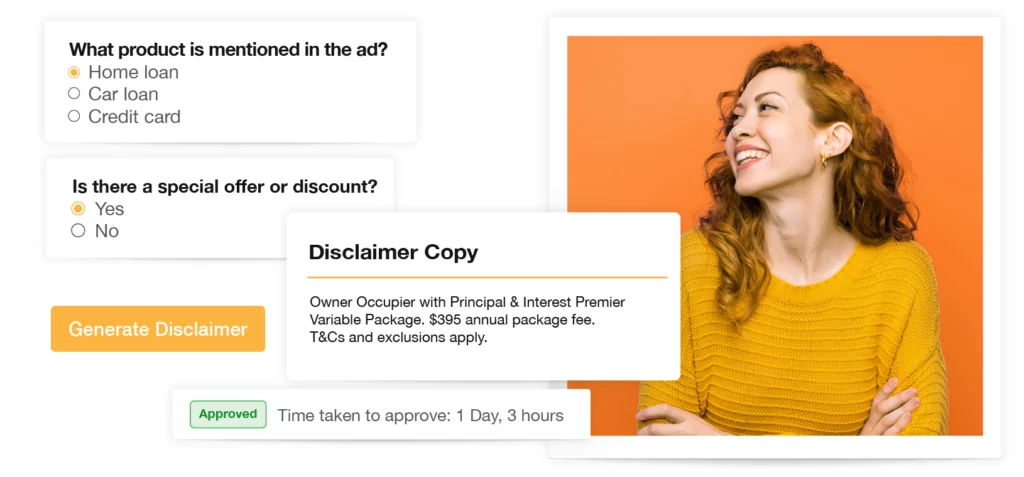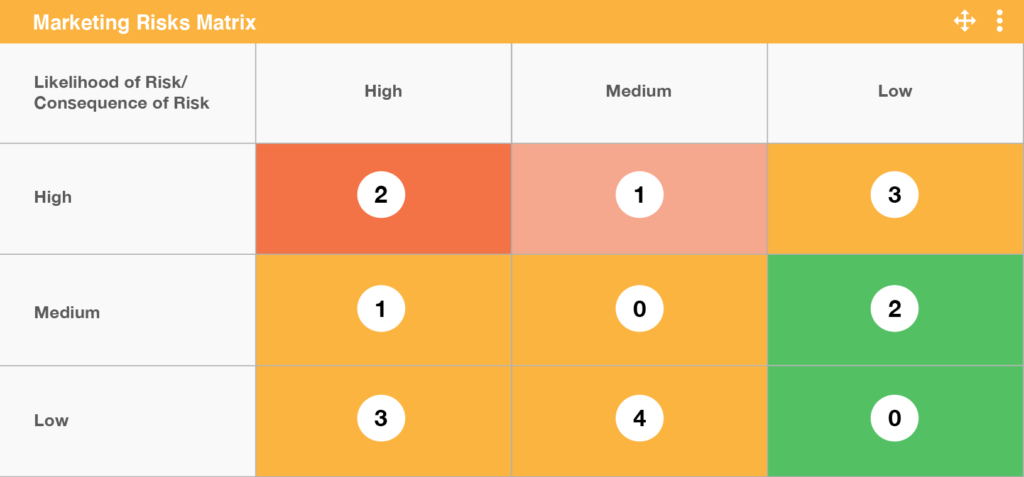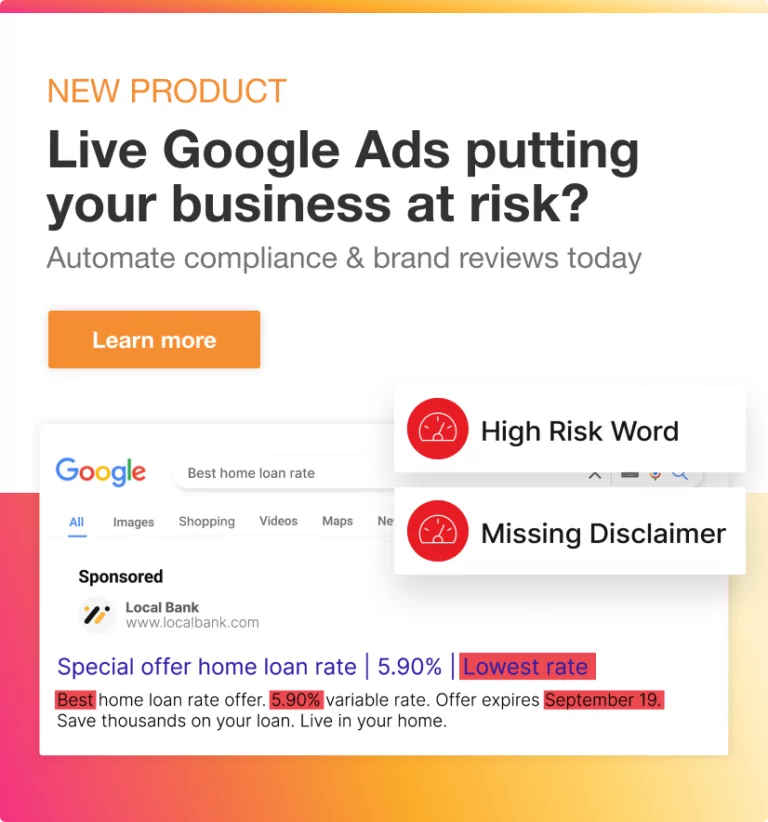What is Marketing Compliance? This guide explains the behemoth that is marketing compliance in plain language. It’ll help you understand what it is, know what to look out for, and steer clear of any breaches.
As General Douglas MacArthur once said, “You are remembered for the rules you break.” And he was right. Break any marketing compliance rules in today’s highly regulated communication battleground and you’re guaranteed to be remembered – just not in a good way.
We are all too familiar with how serious and complex marketing compliance has become. We see clients from all industries grappling with their own version of marketing compliance every day. Marketers are facing legal and ethical challenges on many fronts with ever-evolving rules of engagement. Navigating them is tricky yet critical to protecting your brand reputation and mitigating disastrous fines.
In this guide, we cover the entire gamut of issues impacting marketing compliance:
- What is Marketing Compliance?
- What are the Types of Marketing Compliance?
- The Consequences of Non-compliance
- How to Maintain Marketing Compliance
- The Foundations of Marketing Compliance
- Challenges for Specific Industries
- Marketing Compliance and Content Creation
- Running a Compliant Marketing Team
- How Different Roles Help Compliance
- How Can Marketing Compliance Software Help
We also provide downloadable industry-specific insights into 2024 Marketing Compliance Trends, Threats and Solutions, (see further in the guide).
What is marketing compliance?
Marketing compliance refers to ensuring your organization adheres to legal requirements, industry standards, and ethical guidelines in all its marketing activities. It ensures businesses maintain transparency, integrity, and fairness while protecting the rights and privacy of consumers.
The rules around regulation are set by a range of entities depending on industry and location. Many organizations fall under a mix of federal and state government regulations, industry associations, international organizations, self-regulatory bodies and the legal system itself. They often work in conjunction to ensure regulatory consistency and share information.
Marketing compliance is not merely a box to check; it should be woven into the fabric of your marketing efforts, shaping your messaging, targeting, data collection, and advertising practices.
When we think of marketing compliance, our minds often leap straight to hard and fast legal mandatories, however, there are also compliance requirements surrounding the use of your brand as well as standards-based rules around advertising.
Regulatory compliance: Meeting legal requirements
Regulatory compliance simply means adhering to laws and regulations governing marketing practices. These regulations vary across jurisdictions, media and industry, (more on this later), and often focus on areas such as data protection, disclosure, consumer rights, fair advertising, and anti-spam practices.
Disclosure and transparency are pivotal aspects of marketing compliance. For instance:
- Consumers have the right to know when they are interacting with marketing materials and not mistaking them for editorial or independent content.
- They must be protected from unfair and deceptive advertising, so no false or inflated claims, bait-and-switch tactics, or other misleading practices.
- You cannot spam people. Consumers are protected from unsolicited and intrusive marketing messages with laws like the CAN-SPAM Act in the United States.
- Regulatory compliance extends beyond mere legal adherence – it’s also an ethical obligation, because without trust, there is no business.

Brand Compliance: Ensuring consistency and integrity
Brands are a reflection of the values, emotions, experiences, and perceptions associated with them, shaping consumer attitudes and behaviors. They are personalities within themselves that live in people’s minds. And like any personality, they build over time. Brand compliance means making sure you’re consistently ‘on brand’ across every touchpoint. It goes beyond merely using a logo or trademark correctly; it’s about ensuring that every interaction with your audience reflects your brand’s personality and values.
It’s achieved by ensuring all efforts align consistently. This consistency is essential for building trust, as customers come to associate your brand with certain qualities and expectations. By adhering to brand compliance guidelines, you can create a cohesive and compelling brand image across all touchpoints, whether it’s on your website, social media, advertising materials and product packaging.

Advertising compliance: Ethical and legal ad practices
Advertising compliance focuses on adhering to ethical and legal standards in advertising. Typically enforced by advertising standards boards, their primary purpose is to ensure ads are truthful, transparent, and not misleading. Advertising compliance covers areas such as false or deceptive advertising, endorsements and testimonials, comparative advertising, and disclosure of sponsored content. Standards are readily available to marketers and any breaches are usually uncovered via internal evaluation or consumer complaints.
Marketers not only need to know these standards and guidelines well, they need to take a proactive approach to make sure they are aware of updates.
What Are The Consequences of Non-compliance?
Non-compliance with regulatory, ethical, and legal standards in any industry carries significant consequences. When it comes to marketing compliance, failure to adhere to advertising regulations, data protection laws, or industry-specific guidelines can have far-reaching repercussions. It’s therefore, paramount for organizations to prioritize compliance and invest in robust systems and practices to mitigate the potentially severe fallout. Here are the two greatest casualties of falling foul of marketing compliance:
Eroding brand reputation and consumer trust
Trust is something we earn. And consumer trust is one of the hardest to earn. Audiences are increasingly sophisticated, skeptical, and conscious of their rights and privacy. News of non-compliant practices spreads quickly, especially in the age of social media and instant communication. Negative press, consumer backlash, and public outrage can result in a loss of customer trust, decreased sales, and even boycotts. Missteps can undo years of brand work, and the task of rebuilding a damaged reputation can be long and arduous.
Legal and financial risks
Non-compliance can result in severe legal and financial consequences for businesses. Regulatory bodies have the power to impose fines that can range from thousands to millions of dollars, depending on the severity of the violation and the size of the business. For example, the European Union’s General Data Protection Regulation (GDPR) allows for fines of up to €20 million or 4% of the company’s global annual turnover, whichever is higher. Similarly, the U.S Federal Trade Commission (FTC) has, the authority to impose civil penalties, consumer restitution and injunctions as well as ordering corrective advertising.
How Do I Maintain Marketing Compliance?
Needless to say, maintaining marketing compliance comes with various challenges. Achieving and sustaining compliance can be a complex endeavor, requiring the navigation of numerous challenges and obstacles. Let’s explore some common hurdles organizations face in staying compliant:
Keeping up with evolving regulations
Marketing compliance is not ‘set and forget’ – it’s an ongoing commitment to staying informed and adaptable. Regulatory bodies frequently update rules and requirements to address emerging issues, protect consumer rights, and reflect new technological advancements. Staying updated on changing marketing laws and regulations can be daunting, and that’s why it’s wise to build in alerts and milestones to monitor any changes.
Keep up with evolving technology
The pace and volume of the content cycle has driven innovation in marketing compliance software. Marketing departments of all sizes are using automation and AI to help with a myriad of tasks within the content creation workflow. As marketers are continually asked to do more with less and regulators are themselves integrating tech to identify compliance breaches, it’s critical to keep up with We discuss disclaimer generators and AI content scanners in our section below ‘How Can Marketing Compliance Software Help?’.
Cross-border compliance
If you’re operating across multiple jurisdictions, it introduces another layer of complexities when adhering to diverse marketing regulations. To successfully navigate new territories, it is paramount for businesses to invest in a thorough understanding of the marketing regulations in each jurisdiction where they operate. This includes not only identifying the legal requirements but also comprehending the cultural and social factors that influence consumer expectations and perceptions.
Data privacy and protection
For better or worse, digital technology has become deeply integrated into our lives. This means personal data protection has assumed huge importance. Ever tightening regulations on data privacy demands meticulous handling of personal data. Obtaining consent, implementing robust security measures, and ensuring transparent data practices are critical to marketing compliance, (and trust).
Compliance monitoring and reporting
Compliance software uses automation and AI to reduce the instances of compliance errors. For example, briefing forms can include drop down menus that auto generate pre-approved disclaimers based on a whole range of parameters. For example, an ad for a finance product may vary by medium and by state. Without auto disclaimers, legal teams get bogged down with repetitive low value work which often delays the launch of content.
Markets are also increasingly using AI and machine learning to scan and analyze content to identify potential compliance risks and suggest corrections. Without AI-powered document scanning, humans would have to do all the proofing manually, leading to longer lead times and the higher potential for error.
As well as day to day compliance tools, marketing compliance software can generate reports that provide approval trails as well as other data around risks and trends. These are invaluable during compliance audits or internal investigations.
Pressure to deliver marketing campaigns faster
The fast-paced marketing environment often brings with it pressure to launch campaigns quickly. It can be intense, especially if you work in retail, e-commerce or news. However, this need for speed must be balanced carefully with compliance considerations. Rushing into a campaign without due diligence can lead to unintentional violations of regulations, whether it’s in the form of false advertising claims, privacy breaches, or other legal and ethical missteps. Sometimes you have to hit the brakes to avoid unintentional violations.
What Are the Foundations of Marketing Compliance?
The foundations on which marketing compliance practices are built are the bedrock of ethical and lawful marketing practices. While they take effort to construct, time, money and reputations are often saved when they are done right. These foundations uphold transparency, honesty, and fairness in the marketplace. Let’s delve into some key base elements that underpin effective marketing compliance efforts.
Policies and procedures
Policy and procedure documentation provides the roadmap for navigating marketing compliance. They act as a comprehensive set of guidelines that govern marketing activities, ensuring alignment with a myriad of laws, regulations, and industry-specific standards. The types of areas these policies should cover are advertising claims, data privacy, intellectual property rights, and ethical standards. Guidelines should be clearly defined and ratified to ensure compliance with laws and regulations.
Training and education
Regular training sessions educate employees on regulations, internal policies, and best practices. They are the bridge between regulations, internal policies, and best practices This empowers the marketing team to make informed decisions and stay updated on compliance requirements. After all, well-informed and educated employees are not only better equipped to identify potential marketing compliance risks, but they’re also more capable of proactively seeking solutions and avoiding costly violations.
Monitoring and auditing
Ongoing reviews and assessments of marketing activities help identify compliance risks and deviations from policies. Monitoring can take various forms, including the scrutiny of advertisements, and promotional content to verify that they align with the company’s ethical and legal standards.
Internal audits examine processes and procedures to assess their compliance with both internal and external guidelines. Independent assessments, (mandatory in some industries), are often conducted by third-party experts or regulatory bodies, offer an impartial perspective, further validating an organization’s commitment to compliance.
Enforcement and accountability
Clear procedures for reporting compliance concerns as well as consequences promote accountability and discourage non-compliant behavior. Reporting mechanisms empower team members to bring potential compliance violations to light without fear of retribution. That said, the presence of clear consequences for non-compliant behavior acts as a powerful deterrent. When employees and stakeholders understand that there are repercussions for failing to adhere to established policies and procedures, they are more likely to act in accordance with the rules.
Software and tools
The integration of specialized marketing compliance tools built into creative workflow software is a strategic move that not only eases the burden of compliance but also offers several advantages. These tools are designed to streamline processes by automating the often intricate and time-consuming compliance checks. They can swiftly identify and rectify potential violations, ensuring that marketing campaigns adhere to regulatory standards and company policies. They also allow for centralized documentation and reporting, providing a centralized hub for storing and accessing compliance-related information. This not only simplifies the task of monitoring and maintaining compliance records but also enhances transparency and accountability within the organization.

What Challenges Are There For Specific Industries?
Some industries face unique compliance challenges due to the volume and intricacies of the regulations they must adhere to. Let’s explore some compliance challenges for specific industries:
Financial services
The financial services industry operates in a highly regulated environment to ensure consumer protection, market integrity, and stability. Compliance challenges include disclosure and fairness, anti-money laundering (AML) regulations, know-your-customer (KYC) requirements, data privacy regulations, and securities laws. We’ve developed a guide to 2024 Marketing Compliance Trends, Threats and Solutions specifically for the Financial Services industry, click the download button below.
Insurance
The insurance industry faces compliance challenges related to product and pricing transparency, claims handling, consumer disclosure requirements, and solvency regulations. Compliance efforts involve fair treatment of policyholders, accurate policy disclosure, and regulatory reporting obligations. We’ve developed a guide to 2024 Marketing Compliance Trends, Threats and Solutions specifically for the Insurance industry, click the download button below.
Healthcare and pharmaceuticals
Healthcare and pharmaceutical industries operate under stringent regulations to protect patient safety, maintain data privacy, and ensure ethical marketing practices. Compliance challenges include substantiating product claims, regulatory requirements for clinical trials, drug approvals, marketing materials, and patient data protection. We’ve developed a guide to 2024 Marketing Compliance Trends, Threats and Solutions specifically for the Healthcare sector, click the download button below.
Education and ed tech
The education sector, including traditional institutions and EdTech companies, face compliance requirements related to student privacy, accessibility requirements, data protection, and compliance with accreditation standards. We’ve developed a guide to 2024 Marketing Compliance Trends, Threats and Solutions specifically for the Higher Education sector, click the download button below.
Franchising and retail
Consumer protection laws, advertising regulations, product safety standards, intellectual property rights, and employment laws are the most common compliance hurdles for the franchising and retail sector.
How Do I Manage Marketing Compliance and Content Creation?
Nobody wants to stifle the creative process, but ensuring marketing compliance should be an integral part of the content creation process. By embedding compliance considerations from the start, businesses can prevent potential violations and maintain legal and ethical practices. Here are some helpful steps to ensure compliance during the creative process:
Establish compliance guidelines
Develop clear and comprehensive compliance guidelines that outline the dos and don’ts of marketing content creation. These guidelines should cover legal requirements, brand guidelines, and ethical considerations. Provide examples and practical instructions to help content creators understand compliance expectations.
Conduct compliance training
Train marketing teams on compliance requirements and best practices. Provide education on relevant laws and regulations, industry-specific compliance considerations, and internal policies. Regularly update training materials to reflect changes in regulations and industry standards.
Implement approval processes
Establish a structured approval process for marketing content to ensure compliance. Assign designated people or teams responsible for reviewing and approving content before publication. Everyone should have a thorough understanding of compliance requirements and possess the authority to make necessary modifications.

Use compliance checklists
Create checklists that content creators can use to verify compliance before finalizing content. These checklists can include items such as proper disclosure of sponsored content, adherence to advertising guidelines, accuracy of claims, and compliance with data protection regulations. Regularly update checklists to reflect any changes in regulations or internal policies.
Collaborate with legal and compliance teams
Maintain open lines of communication with legal and compliance teams throughout the content creation process. Seek their input and guidance to ensure alignment with legal requirements and mitigate potential risks. Involve these teams in the review and approval process to leverage their expertise in identifying compliance issues.
How Do I Run a Compliant Marketing Team?
Maintaining marketing compliance requires a proactive approach and a commitment to best practices. Here are some strategies to help run a compliant marketing team:
Stay informed and updated
The marketing landscape is continuously evolving, and so are the regulations governing it. Rules can vary across a range of variables, such as country, area, media, product, industry and even time of day. Staying updated and adapting to these changes as well as industry trends and best practices is crucial to ensure compliance. You should regularly review and update compliance policies, guidelines, and training materials to reflect these evolving standards.
Foster a compliance culture
Promote a culture of compliance within the marketing team and across the organization. Emphasize the importance of ethical marketing practices, accountability, and adherence to regulations. Encourage open communication and provide channels for team members to seek guidance or report compliance concerns.
Conduct regular audits and assessments
Regularly audit marketing practices to identify any compliance gaps or areas for improvement. Assess internal processes, data handling practices, and marketing campaigns to ensure alignment with legal requirements.
Document compliance efforts
Maintain comprehensive records of compliance efforts, including training records, approval processes, and compliance assessments. Documentation helps demonstrate a commitment to compliance and can serve as evidence of due diligence in case of an audit or investigation.
Engage external experts
Consider engaging external experts, such as legal consultants or compliance professionals, to provide guidance and support. Their expertise can help navigate complex regulations, assess compliance practices, and identify potential risks.
How Different Roles Help Compliance
Effective marketing compliance is a collective effort.It requires collaboration from various roles within a marketing team. Each role within the team brings a unique set of skills and responsibilities that collectively contribute to the overarching goal of ensuring adherence to legal and ethical standards. Let’s explore how different team members contribute to compliance:
Marketing campaign managers
Marketing campaign managers oversee campaign planning, execution, and monitoring to ensure compliance with regulations and brand guidelines. They research applicable laws, collaborate with legal professionals, and monitor performance for compliance issues.
Brand managers
Brand managers are the guardians of a company’s identity and reputation. They maintain brand integrity and consistency. They’re responsible for developing brand guidelines, reviewing marketing content, and conducting brand audits to ensure compliance with brand standards.
Marketing leaders
Marketing leaders provide strategic direction for compliance efforts. They hold a pivotal role in shaping and overseeing an organization’s marketing compliance efforts. Their influence extends beyond day-to-day operations as they provide the strategic vision for ensuring that the company adheres to regulations and ethical standards. They establish a compliance culture, allocate resources, collaborate with legal professionals, and set performance metrics for compliance evaluation.
Collaboration with legal professionals is another essential aspect of their role. They work closely with legal counsel to interpret, implement, and stay up-to-date with evolving legislation. They are also responsible for setting key performance indicators (KPIs) for evaluating compliance. Marketing leaders are ultimately the driving force behind compliance initiatives.
Content creators
Content creators, such as copywriters and designers, produce compliant marketing materials. They have to produce content that not only captivates audiences but also abides by ethical and legal principles. They are responsible for adhering to brand guidelines, ensuring accuracy in messaging, including appropriate disclosures, and collaborating with marketing leaders.
Legal and compliance professionals
Legal and compliance professionals are essential members of any marketing compliance team. They bring a wealth of knowledge to the table and offer guidance on regulations and ethical standards. They stay updated with laws, collaborate with marketing teams, and conduct internal audits to identify compliance risks.
How Can Marketing Compliance Software Help?
The complexity of marketing compliance can be simplified with the use of marketing compliance software. These tools provide automated solutions for managing and monitoring compliance requirements. Some key features of marketing compliance software include:
Content review and approval workflows
Software tools streamline the content review and approval process, ensuring compliance checks are built into the workflow. They enable designated approvers to review and provide feedback on marketing content, ensuring compliance with legal and brand guidelines.
Data privacy and consent management
Compliance software helps businesses manage data privacy requirements, including obtaining consent, managing data subject rights, and maintaining transparent privacy practices.
Compliance monitoring and reporting
Compliance software monitors marketing activities, identifies potential compliance risks, and generates reports to track and demonstrate compliance efforts. These reports can be invaluable during audits or investigations.
Regulatory updates and alerts
Software tools provide timely updates on regulatory changes and industry best practices, ensuring businesses stay informed about evolving compliance requirements.

In the end, it never ends…
Marketing compliance is like laundry – it’s never done. It requires an ongoing effort of continuous monitoring, adaptation to changes in regulations, and a culture of ethical marketing practices. By prioritizing marketing compliance, you can build a solid foundation for long-term success by avoiding breaches and maintaining trust with your customers.
If you’d like help making your marketing compliance challenges easier to navigate, contact us for a demo. We’d love to hear from you.








